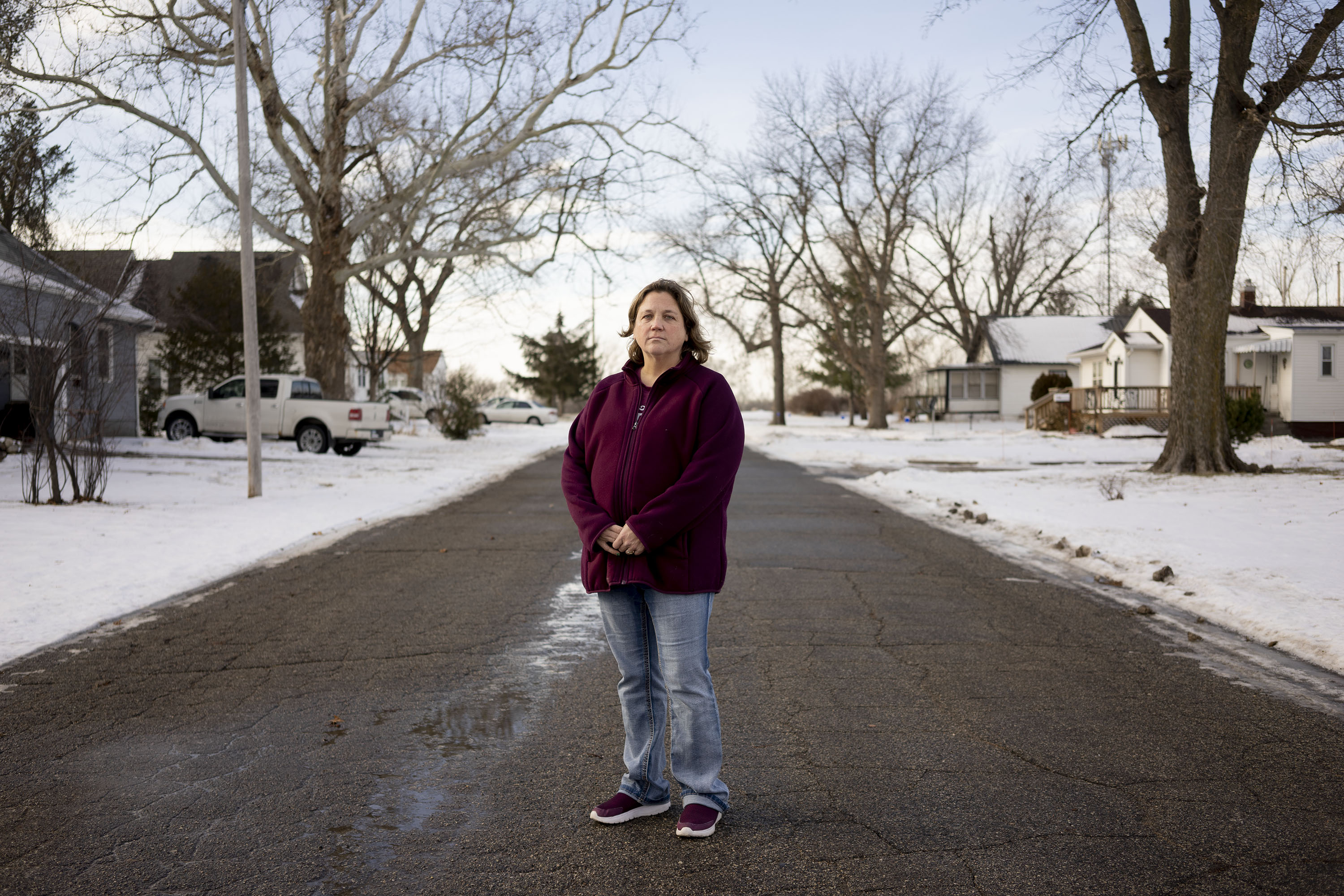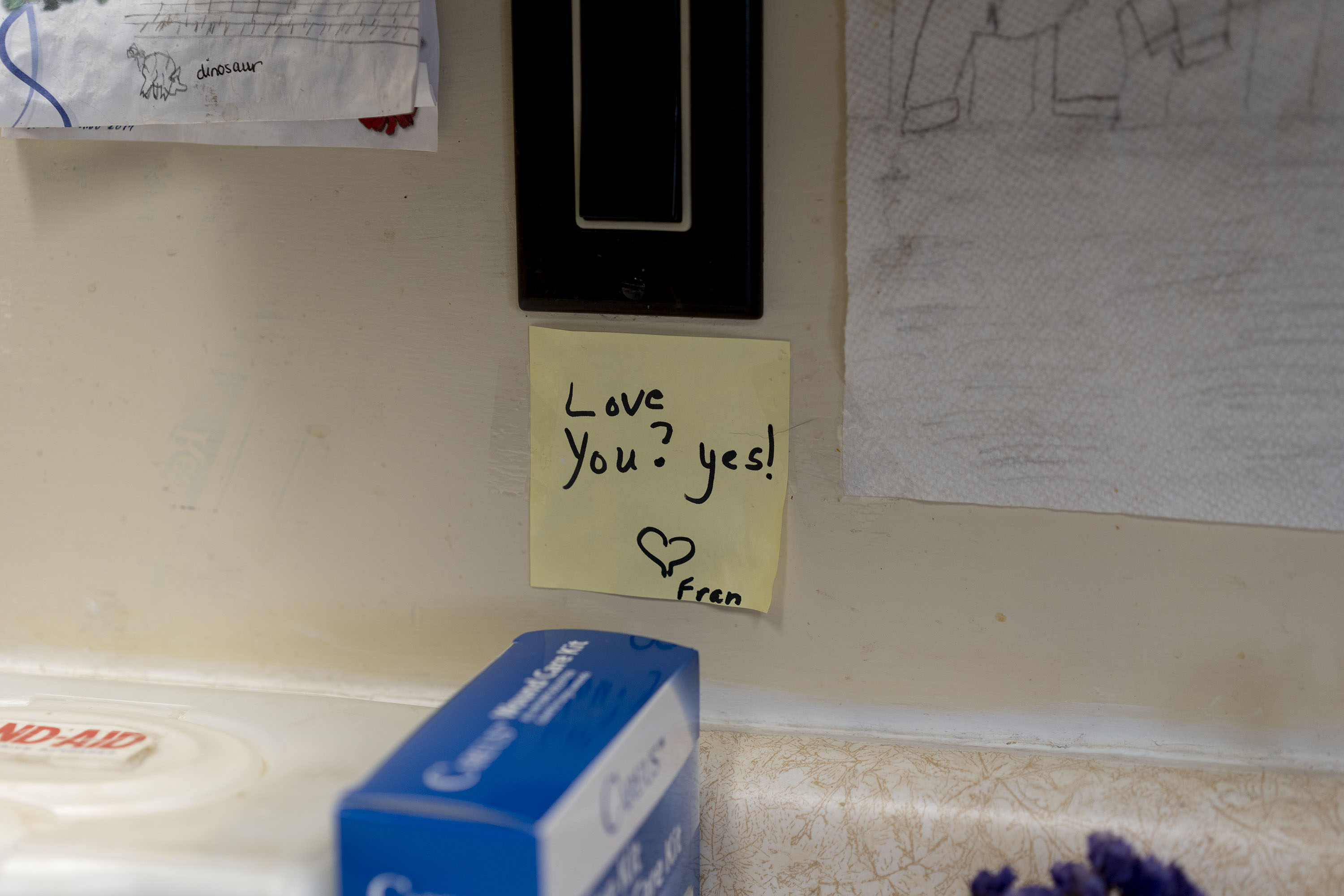PERRY, Iowa — Fran Ruhl’s family received a startling letter from the Iowa Department of Human Services four weeks after she died in January 2022.
“Dear FAMILY OF FRANCES RUHL,” the letter began. “We have been informed of the death of the above person, and we wish to express our sincere condolences.”
The letter got right to the point: Iowa’s Medicaid program had spent $226,611.35 for Ruhl’s health care, and the government was entitled to recoup that money from her estate, including nearly any assets she owned or had a share in. If a spouse or disabled child survived Ruhl, the collection could be delayed until after their death, but the money would still be owed.
The notice said the family had 30 days to respond.
“I said, ‘What is this letter for? What is this?’” said Ruhl’s daughter, Jen Coghlan.
It seemed bogus, but it was real. Federal law requires all states to have “estate recovery programs,” which seek reimbursements for spending under Medicaid, the joint federal and state health insurance program for people with low incomes or disabilities. The recovery efforts collect more than $700 million a year, according to a 2021 report from the Medicaid and CHIP Payment and Access Commission, or MACPAC, an agency that advises Congress.
States have leeway to decide whom to bill and what type of assets to target. Some states collect very little. For example, Hawaii’s Medicaid estate recovery program collected just $31,000 in 2019, according to the federal report.
Iowa, whose population is about twice Hawaii’s, recovered more than $26 million that year, the report said.
Email Sign-Up
Iowa uses a private contractor to recoup money spent on Medicaid coverage for any participant who was 55 or older or was a resident of a long-term care facility when they died. Even if an Iowan used few health services, the government can bill their estate for what Medicaid spent on premiums for coverage from private insurers known as managed-care organizations.
Supporters say the clawback efforts help ensure people with significant wealth don’t take advantage of Medicaid, a program that spends more than $700 billion a year nationally.
Critics say families with resources, including lawyers, often find ways to shield their assets years ahead of time — leaving other families to bear the brunt of estate recoveries. For many, the family home is the most valuable asset, and heirs wind up selling it to settle the Medicaid bill.
For the Ruhl family, that would be an 832-square-foot, steel-sided house that Fran Ruhl and her husband, Henry, bought in 1964. It’s in a modest neighborhood in Perry, a central Iowa town of 8,000 people. The county tax assessor estimates it’s worth $81,470.
Henry Ruhl, 83, wanted to leave the house to Coghlan, but since his wife was a joint owner, the Medicaid recovery program could claim half the value after his death.
Fran Ruhl, a retired child care worker, was diagnosed with Lewy body dementia, a debilitating brain disorder. Instead of placing her in a nursing home, the family cared for her at home. A case manager from the Area Agency on Aging suggested in 2014 they look into the state’s “Elderly Waiver” program to help pay expenses that weren’t covered by Medicare and Tricare, the military insurance Henry Ruhl earned during his Iowa National Guard career.
Coghlan still has paperwork the family filled out. The form said the application was for people who wanted to get “Title 19 or Medicaid,” but then listed “other programs within the Medical Assistance Program,” including Elderly Waiver, which the form explained “helps keep people at home and not in a nursing home.”
Coghlan said the family didn’t realize the program was an offshoot of Medicaid, and the paperwork in her file did not clearly explain the government might seek reimbursement for properly paid benefits.
Some of the Medicaid money went to Coghlan for helping care for her mother. She paid income taxes on those wages, and she said she likely would have declined to accept the money if she’d known the government would try to scoop it back after her mother died.
 Henry keeps the ashes of his wife, Fran, in an urn on a side table in the home they shared for nearly 60 years. After he dies, the family will bury Henry and Fran together at the state veterans cemetery. (KC McGinnis for KHN)
Henry keeps the ashes of his wife, Fran, in an urn on a side table in the home they shared for nearly 60 years. After he dies, the family will bury Henry and Fran together at the state veterans cemetery. (KC McGinnis for KHN)  Henry Ruhl of Perry, Iowa, lost his wife, Fran, in January 2022. A few weeks after her death, he was startled by a notice saying her estate owed more than $226,000 to Iowa’s Medicaid program for care she received. (KC McGinnis for KHN)
Henry Ruhl of Perry, Iowa, lost his wife, Fran, in January 2022. A few weeks after her death, he was startled by a notice saying her estate owed more than $226,000 to Iowa’s Medicaid program for care she received. (KC McGinnis for KHN)
Iowa Medicaid Director Elizabeth Matney said that in recent years the state added clearer notices about the estate recovery program on forms people fill out when they apply for coverage.
“We do not like families or members being caught off guard,” she said in an interview. “I have a lot of sympathy for those people.”
Matney said her agency has considered changes to the estate recovery program, and she would not object if the federal government limited the practice. Iowa’s Medicaid estate collections topped $30 million in fiscal year 2022, but that represented a sliver of Medicaid spending in Iowa, which is over $6 billion a year. And more than half the money recouped goes back to the federal government, she said.
Matney noted families can apply for “hardship exemptions” to reduce or delay recovery of money from estates. For example, she said, “if doing any type of estate recovery would deny a family of basic necessities, like food, clothing, shelter, or medical care, we think about that.”
Sumo Group, a private company that runs Iowa’s estate recovery program, reported that 40 hardship requests were granted in fiscal 2022, and 15 were denied. The Des Moines company reported collecting money from 3,893 estates that year. Its director, Ben Chatman, declined to comment to KHN. Sumo Group is a subcontractor of a national company, Health Management Systems, which oversees Medicaid estate recoveries in several states. The national company declined to identify which states it serves or discuss its methods. Iowa pays the companies 11% of the proceeds from their estate recovery collections.
The 2021 federal advisory report urged Congress to bar states from collecting from families with meager assets, and to let states opt out of the effort altogether. “The program mainly recovers from estates of modest size, suggesting that individuals with greater means find ways to circumvent estate recovery and raising concerns about equity,” the report said.
U.S. Rep. Jan Schakowsky introduced a bill in 2022 that would end the programs.
The Illinois Democrat said many families are caught unawares by Medicaid estate recovery notices. Their loved ones qualified for Medicaid participation, not realizing it would wind up costing their families later. “It’s really a devastating outcome in many cases,” she said.
Schakowsky noted some states have tried to avoid the practice. West Virginia sued the federal government in an attempt to overturn the requirement that it collect against Medicaid recipients’ estates. That challenge failed.
Schakowsky’s bill had no Republican co-sponsors and did not make it out of committee. But she hopes the proposal can move ahead, since every member of Congress has constituents who could be affected: “I think this is the beginning of a very worthy and doable fight.”
 Jen Coghlan outside the modest home where she grew up in Perry, Iowa. Her father, Henry Ruhl, plans to leave the home to her, but Coghlan expects she’ll have to sell it after he dies to help settle a large bill from Medicaid for the care of her mother, Fran, who died in January 2022. Coghlan says the family didn’t realize that her mother was on Medicaid and that they are responsible to pay the program back for her care. (KC McGinnis for KHN)
Jen Coghlan outside the modest home where she grew up in Perry, Iowa. Her father, Henry Ruhl, plans to leave the home to her, but Coghlan expects she’ll have to sell it after he dies to help settle a large bill from Medicaid for the care of her mother, Fran, who died in January 2022. Coghlan says the family didn’t realize that her mother was on Medicaid and that they are responsible to pay the program back for her care. (KC McGinnis for KHN)
States can limit their collection practices. For example, Massachusetts implemented changes in 2021 to exempt estates of $25,000 or less. That alone was expected to slash by half the number of targeted estates.
Massachusetts also made other changes, including allowing heirs to keep at least $50,000 of their inheritance if their incomes are less than 400% of the 2022 federal poverty level, or about $54,000 for a single person.
Prior to the changes, Massachusetts reported more than $83 million in Medicaid estate recoveries in 2019, more than any other state, according to the MACPAC report.
Supporters of estate recovery programs say they provide an important safeguard against misuse of Medicaid.
Mark Warshawsky, an economist for the conservative American Enterprise Institute, argues that other states should follow Iowa’s lead in aggressively recouping money from estates.
Warshawsky said many other states exclude assets that should be fair game for recovery, including tax-exempt retirement accounts, such as 401(k)s. Those accounts make up the bulk of many seniors’ assets, he said, and people should tap the balances to pay for health care before leaning on Medicaid.
Warshawsky said Medicaid is intended as a safety net for Americans who have little money. “It’s the absolute essence of the program,” he said. “Medicaid is welfare.”
People should not be able to shelter their wealth to qualify, he said. Instead, they should be encouraged to save for the possibility they’ll need long-term care, or to buy insurance to help cover the costs. Such insurance can be expensive and contain caveats that leave consumers unprotected, so most people decline to buy it. Warshawsky said that’s probably because people figure Medicaid will bail them out if need be.
Eric Einhart, a New York lawyer and board member of the National Academy of Elder Law Attorneys, said Medicaid is the only major government program that seeks reimbursement from estates for properly paid benefits.
Medicare, the giant federal health program for seniors, covers virtually everyone 65 or older, no matter how much money they have. It does not seek repayments from estates.
“There’s a discrimination against what I call ‘the wrong type of disease,’” Einhart said. Medicare could spend hundreds of thousands of dollars on hospital treatment for a person with serious heart problems or cancer, and no government representatives would try to recoup the money from the person’s estate. But people with other conditions, such as dementia, often need extended nursing home care, which Medicare won’t cover. Many such patients wind up on Medicaid, and their estates are billed.
On a recent afternoon, Henry Ruhl and his daughter sat at his kitchen table in Iowa, going over the paperwork and wondering how it would all turn out.
The family found some comfort in learning that the bill for Fran Ruhl’s Medicaid expenses will be deferred as long as her husband is alive. He won’t be kicked out of his house. And he knows his wife’s half of their assets won’t add up to anything near the $226,611.35 the government says it spent on her care.
“You can’t get — how do you say it?” he asked.
“Blood from a turnip,” his daughter replied.
“That’s right,” he said with a chuckle. “Blood from a turnip.”
 Fran Ruhl often left affectionate notes for her husband, Henry, in their home in Perry, Iowa. Several are still posted, a year after her death. (KC McGinnis for KHN)
Fran Ruhl often left affectionate notes for her husband, Henry, in their home in Perry, Iowa. Several are still posted, a year after her death. (KC McGinnis for KHN)
